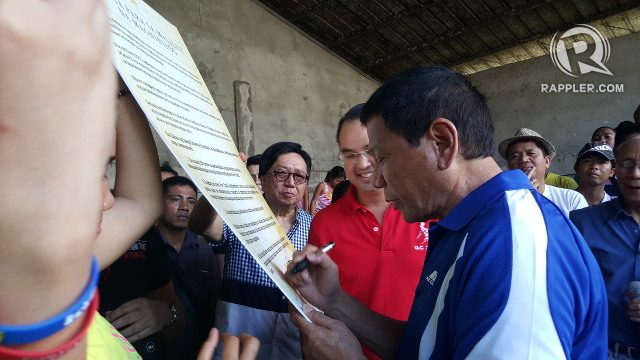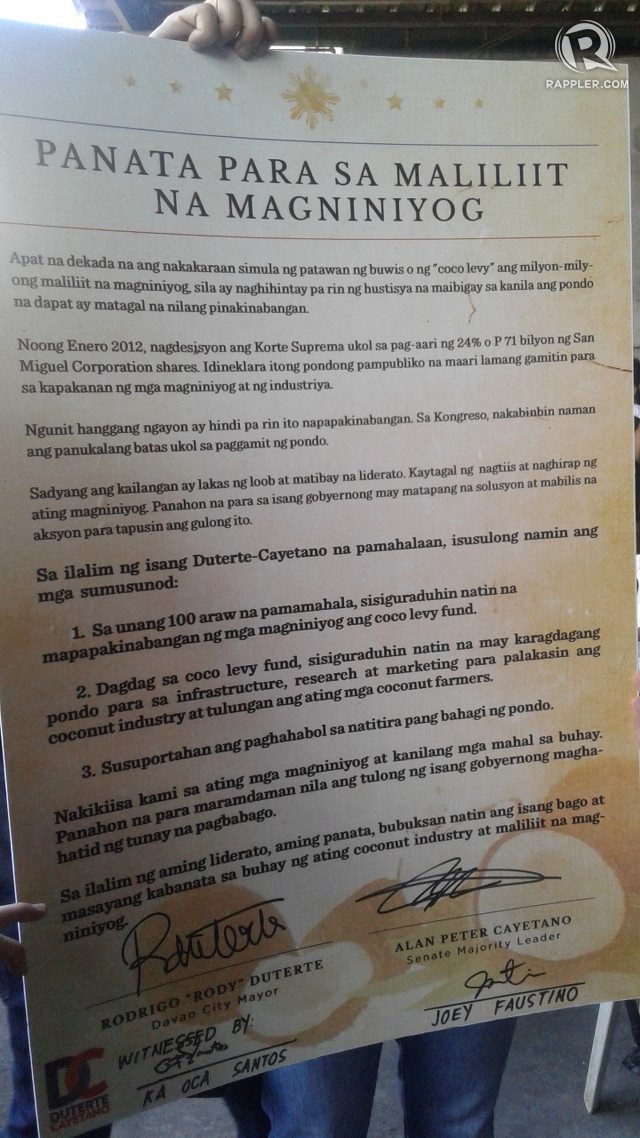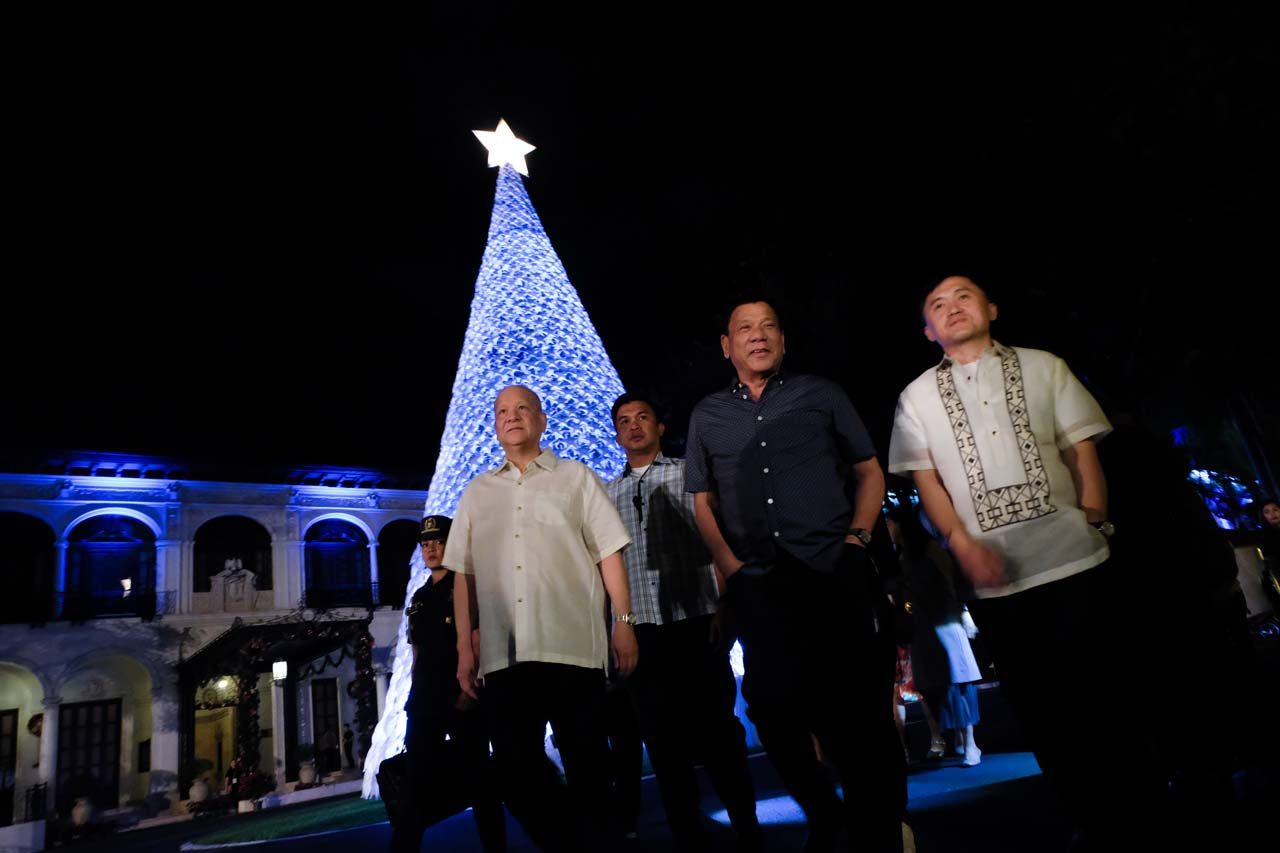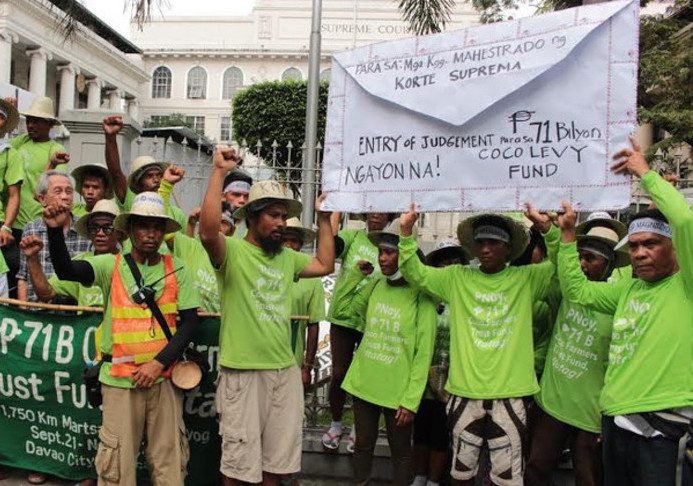SUMMARY
This is AI generated summarization, which may have errors. For context, always refer to the full article.

Conclusion
READ: Part 1: Coco levy fund scam: Gold for the corrupt, crumbs for the farmers
READ: Part 2: The politics of the coco levy: From Marcos to Noynoy Aquino
MANILA, Philippines – It’s been a promise made in every presidential campaign – that government would finally return the money to coco farmers. Yet, almost 45 years since former president Ferdinand Marcos and his cronies, including Eduardo “Danding” Cojuangco Jr, imposed coco levies or taxes on coconut products, farmers have yet to see and feel the “reward” promised them.
President Rodrigo Duterte made the same commitment when he was campaigning last year. The issue is personal, he said, because his late mother was also a coconut farmer.
But will the bill on the release of the coco funds finally pass under his administration?
The Philippine Commission for Good Government said the total worth of coco levy assets, excluding those pending litigation and recovery, is P93 billion. This includes the P74-billion worth of San Miguel shares bought using coco levy and awarded by the Supreme Court to the government in 2014. (READ: The San Miguel-coco levy saga)
In 2015, after this SC decision, Aquino issued two executive orders on the inventory, privatization, and transfer of the funds to the government.
The Confederation of Coconut Farmers Organizations of the Philippines (Confed), however, challenged these orders before the High Court.
Coconut Industry Reform Movement (COIR) executive director Joey Faustino said the group is “a Danding Cojuangco-related group of big business and landowners who lorded over the coco levy funds under the dictatorship (Cocofed).”
In response to the petition, the Court temporarily stopped the implementation of the two EOs.
But this is only a side issue given the bigger picture. The Court, after all, declared that for the release of funds to be properly done, Congress has to enact a law on it.
“Through the years the presence and influence of Danding Cojuangco, through his partymates and allies in Congress, have made it difficult for any bill on the coco levy to pass,” Faustino said.
Duterte’s promise
At the height of the presidential campaign last year, Duterte vowed to return the money to the farmers within the first 100 days of his term. He even signed a manifesto in front of farmers, saying he will support efforts to recover the contested funds that remain with the Danding Cojuangco-led SMC.

In an interview in Quezon in March 2016, Duterte said he favored the creation of a trust fund for farmers.
“Sabi ni Ka Oca [Oscar Santos], huwag mo ibigay ‘yung pera, baka maubos. I-return but [through] cooperative tapos kung gusto nila mag-counterpart [funds],” he said, referring to former Quezon representative Oscar Santos who is a leading figure in the establishment of a trust fund for farmers.
(Ka Oca says not to give the cash directly, because the cash might be depleted. Better to return the funds but through a cooperative. Then they can prepare counterpart funds, if they want.)
But more than 6 months into his presidency, the funds remain undistributed. Duterte’s Cabinet blames it on the SC’s TRO.
Duterte, known for changing his views often, has so far not changed his mind on how best to dispose of the funds.
In fact, Finance Secretary Carlos Dominguez III said the President supports the bill that will allow coconut farmers to benefit from the funds.
“I’ve discussed this with the President and we believe that legislation is necessary to utilize the coco levy funds for the benefit of farmers in the coconut areas,” Dominguez said during a recent Senate hearing, according to a Department of Finance press release sent on October 31.
“The President has said that [the fund] will be exclusively used for the benefit of the coconut farmers,” Dominguez added, echoing the 2014 SC decision.
Congress and an ‘urgent’ bill
At present, the coco levy trust fund bill is pending in the 17th Congress. The measure still has a long way to go in both chambers. It is now in the period of interpellation and amendments in the Senate while it is still at the committee level in the House of Representatives.
Asked how confident he is about the passage of the measure in the Senate, Senator Francis Pangilinan said it is hard to predict how his colleagues would vote. Pangilinan was the presidential adviser on food security and agriculture under the previous administration.
“It’s hard to tell considering that the Senate can be full of surprises. Thus we need to be vigilant and persistent in pushing for its passage,” Pangilinan told Rappler in a message.
Pangilinan said it would help if Duterte certified the measure as urgent.
“We can only hope it will pass and do our very best to marshall its passage. If the President certifies the bill as urgent and uses the powers of his office to push for its enactment then it will most certainly be enacted sooner,” he said.
But even then, a certification is not an assurance that the measure will be approved. In the 16th Congress, Aquino certified the bill as urgent but it still failed in the Senate.
Senator Cynthia Villar, chairperson of the agriculture committee in the 16th Congress, denied it is her fault that the bill failed in the past congress. This was after COIR’s Faustino alleged Villar’s words then did not match her actions.
“But that was as far as it went. The noble words coming from the senator were the exact opposite of actions that followed. She then refused to meet with the coconut farmers, Ka Oca Santos, and (former senator) Ka Bobby Tañada,” Faustino said.
“And as the 2016 election got nearer, Villar decided to simply, without valid reason, abandon the measure and not forward the consolidated bill for plenary discussions,” he added.
But Villar said there was simply a disagreement among senators on how to invest the money. She said former senator Sergio Osmeña III had wanted to do so aggressively while she wanted to be more careful.
“No, it’s not true. ‘Di nagkasundo kung paano iinvest yung trust fund (There was no agreement on how to invest the trust fund). Osmeña wants na aggressive, me I want safe. Kasi background ko finance mahirap na kung may mangyari diyan, ang tagal-tagal hinintay ng farmers (Because my background is finance and I know it will be difficult if something bad happens to the money, considering the farmers have long waited for it),” Villar told Rappler.
“Mas ok na sa akin na ma-delay basta maayos, kaysa mabilisan na mali-mali (I don’t mind if the bill is delayed as long as it is right, than to rush it but but have a lot of mistakes),” she added.
Will Duterte certify it as urgent?
With all this, will Duterte certify the bill as urgent to push Congress, dominated by his allies, to pass the legislation?
Cabinet Secretary Leoncio Evasco Jr told Rappler they had already issued the certification in December 2016. “We have written a letter to Congress through the PLLO (Presidential Legislative Liasion Office) certifying it as urgent,” Evasco said in a text message.
But Undersecretary Antonio Gallardo of the Senate PLLO said they have not received any certification.
So far, according to the office of Pangilinan, there is only a letter saying that the coco levy trust fund bill is included in the priority legislative agenda. That is different from Malacañang’s certification of a bill as urgent.
Asked about this, Evasco said: “I don’t know but we have submitted that before Christmas.”
Ties that bind
Faustino, who was one of the witnesses when Duterte signed the manifesto in 2016, said he hopes that Duterte would fulfill his promise to the coconut farmers, the country’s poorest of the poor.
He, however, admitted his concern about the ties of Duterte and Ramon S. Ang, president and CEO of San Miguel Corporation – one of the companies bought by the coco levy funds – and a protégé of Danding Cojuangco.
“Bumababa ang kumpyansa, in a way (I lost a bit of confidence in a way). We know how politics goes,” he said, citing past administrations that promised to return the funds to farmers to no avail.
Ang was one of Duterte’s guests during a Christmas party in Malacañang, which was attended by officers and staff of the Office of the President. Duterte also revealed that Ang donated “not a lot, but not too little” to his 2016 campaign.

Ang, however, is not listed in the President’s Statement of Contributions and Expenditures (SOCE) submitted to the Commission on Elections (Comelec). (READ: Who’s who in Duterte’s poll contributors list)
“Alam mo, we became fast friends because, alam mo, may, ang tao may ano eh (You know, we became fast friends because you know that the person)… You have a disarming attitude of humility. Talagang madi-disarm ka (So you will really be disarmed), so we became fast friends. Until now,” said Duterte of Ang.
He added: “Sabi ko (I told him), I would be happy if you would share, break bread with me during our Christmas.”

Despite this, Faustino stressed that the discussion has reached a point when the need to return the money to coconut farmers is no longer debatable.
It’s simply a question of how – and when.
“All it takes is political will,” Duterte said. “The Supreme Court already decided to return the fund to the farmers… Failure to do so is tantamount to estafa.” – Rappler.com
READ: Part 1: Coco levy fund scam: Gold for the corrupt, crumbs for the farmers
READ: Part 2: The politics of the coco levy: From Marcos to Noynoy Aquino
Add a comment
How does this make you feel?
There are no comments yet. Add your comment to start the conversation.